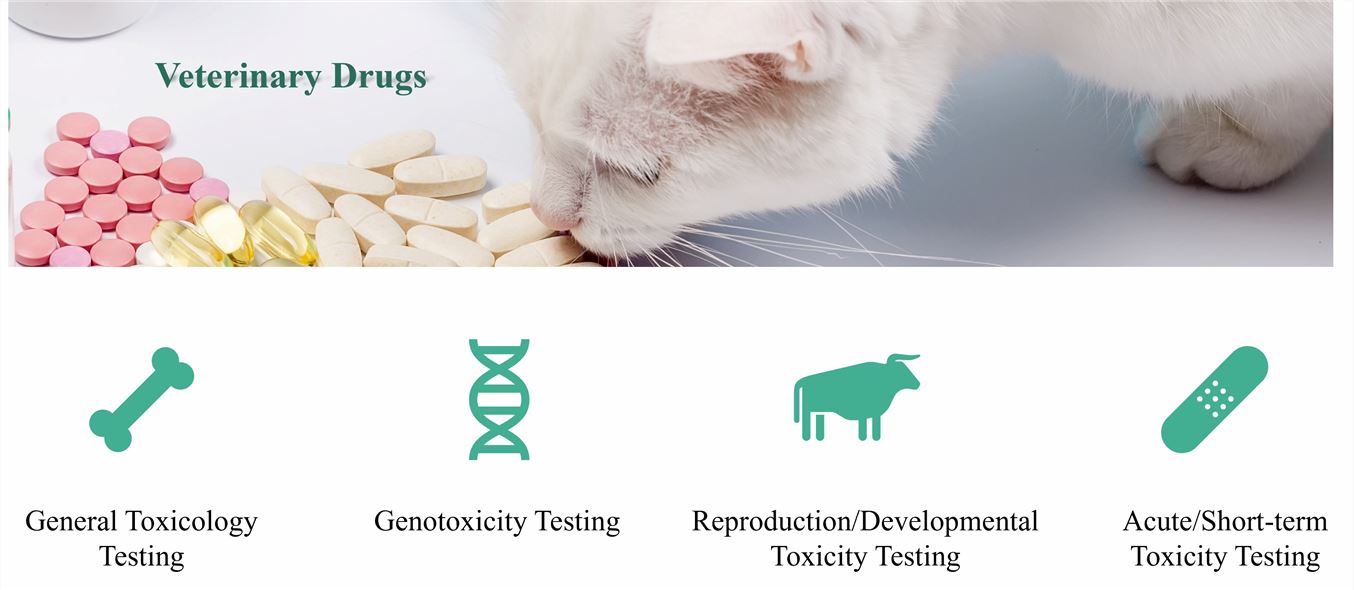As a trusted partner for preclinical veterinary toxicology services, CD Formulation aims to deliver high-quality results that protect animal safety while expediting development timelines. Our state-of-the-art facilities and experienced team of toxicologists enable us to conduct a wide range of studies, including acute and chronic toxicity testing, reproductive and developmental toxicity studies, genotoxicity assessments, and environmental risk evaluations.

What is the Toxicology?
The toxicology of veterinary drugs entails evaluating the potential toxic effects that may occur when animals are exposed to these pharmaceutical products. This includes identifying potential target organs for toxicity, determining no observed adverse effect levels (NOAEL), and investigating general toxic syndromes that may occur. The overarching goals are to establish clinically relevant safety margins, identify safe dosing regimens, and aid in the establishment of withdrawal periods to protect drug safety.
What Can We Do for Veterinary Drug Toxicology Research?
|
Acute/Short-term Toxicity Testing |
We conduct rodent studies involving daily dosing for 14 days to assess the potential adverse effects of veterinary drugs. Detailed clinical observations, body weight measurements, and extensive analysis of clinical and anatomical pathology enable the detection of adverse effects up to lethal doses. |
| Genotoxicity Testing |
Our genotoxicity assessments employ bacterial reverse mutation and chromosomal aberration assays to evaluate the potential for gene mutations and clastogenicity caused by the test articles. These studies provide insights into the genetic toxicity of veterinary drugs. |
| Reproduction/Developmental Toxicity Testing |
To evaluate the effects of veterinary drugs on reproductive function and offspring, we conduct studies involving dosing of parental animals, mating, embryofetal incubation, and post-natal assessments. These investigations provide valuable data on potential reproductive and developmental toxicities. |
| Local Tolerance Testing |
Repeated application studies via dermal, ocular, and parenteral routes are conducted to assess potential irritation at injection sites or mucous membranes. These studies help evaluate the local tolerance of veterinary drugs. |
| General Toxicology Testing |
Non-rodent species, such as pigs and dogs, are used in our trials to provide insights into toxicological responses at therapeutic doses over 90 days. These studies, including toxicokinetics, help assess the general toxicological effects of veterinary drugs. |
| Veterinary Drug Safety Testing |
In vitro assays and telemetered animal models are utilized to screen for unintended interactions in the central nervous, cardiac, and respiratory systems at exposure levels relevant to veterinary use. These studies help identify and mitigate potential safety concerns. |
Applications of Our Veterinary Toxicology Research
- Safety Margin Determination
Our toxicology studies aid in determining the safe starting doses for clinical trials by establishing the safety margin between the therapeutic dose and potential toxic effects.
- Target Organ Identification and Risk Mitigation
By identifying target organs and potential toxicities, our studies guide risk mitigation strategies. This information allows for the development of safer medications by minimizing potential adverse effects on specific organs or systems.
- Evaluation of Novel Formulations and Combinations
We assess the safety of novel formulations, routes of delivery, and combinations of veterinary drugs. This allows for the development of innovative treatment options while ensuring their safety and efficacy.
- Cross-Species Extrapolation
Our studies aid in the extrapolation of toxicological data from animal models to humans, enhancing the relevance and applicability of research findings in both human and veterinary medicine.
- Generic Product Development
Our toxicology programs support the development of generic veterinary products by bridging the safety data from reference products, ensuring the safety and efficacy of generic alternatives.
Why Choose Our Toxicology Services?
- Dedicated animal housing facilities with biosafety/biocontainment measures.
- Pathology laboratory for hematology, serum chemistry, urinalysis, etc.
- Anatomic pathology laboratory for necropsy, histopathology and microscopic analysis.
- State-of-the-art in vivo safety pharmacology monitoring equipment.
- Advanced biomarker discovery platform with proteomics and transcriptomics.
- Telemetry systems for continuous ECG, EEG, respiratory monitoring.
- Scientists specialized in veterinary species, animal welfare and regulatory guidance.
- Data management systems and toxicological expertise for NOAEL evaluation.
CD Formulation offers a comprehensive range of veterinary toxicology services designed to assess the safety, potential risks, and efficacy of medications used on animals. Contact us today to inquire about our veterinary toxicology services and let us contribute to the development of safer and more effective medications for veterinary patients!



